A protest by public transport workers in Sofia blocked the city centre on April 14. the trade unions demanded a greater wage increase than currently planned, along with improved working conditions. However, their demands disrupted traffic and caused huge traffic jams throughout the capital.

The protest by public transport employees in Sofia, Ruse, and Varna began at 8:00 a.m. with blockades at three key intersections in Sofia: Orlov Most (Eagles , Bridge) the intersection of Dragan Tsankov Blvd. near the National Stadium "Vasil Levski", and Macedonia Square. From there, the three groups marched toward the Ministry of Finance, where the demonstrators, dissatisfied with their pay, symbolically placed a ladder labeled "Dialogue" as a metaphorical bridge between them and the Ministry of Finance.

Later, the protesters headed to Sofia Municipality, where the march concluded. They requested meetings with both municipal and Ministry of Finance representatives, but no such meeting took place. Transport workers from Ruse and Varna also joined the protest.
According to the Confederation of Independent Trade Unions in Bulgaria (CITUB), an increase in state subsidies is urgently needed: BGN 29 million for Sofia’s public transport, BGN 6.5 million for Varna, BGN 700,000 for Ruse, and BGN 4.5 million for the Executive Agency "Automobile Administration". Protesters are united in their demand for a salary increase of no less than BGN 400 per employee.

Miroslav Chakurov: "It’s a disgrace that every year we have to protest for basic things like fair wages and decent working conditions—nothing more."
Draga Blagoeva added: "We are calling for a firm increase of BGN 400 per employee for all workers in the four public transport companies."
Todor Kapitanov, Vice President of CITUB, said: "Today, we are asking for a total of BGN 400 million for the public transport systems of Sofia, Ruse, and Varna, as well as for all employees in the Automobile Administration."

In response to the protests, the Ministry of Finance issued a statement shifting responsibility to the municipalities. It emphasised that determining wage levels, funding expenditures, and managing finances of municipally owned companies lies within the authority of each mayor. According to the State Budget Law, subsidies for public transport in Sofia are set at BGN 106 million—a BGN 17 million increase ompared to 2024.
Deputy Mayor for Finance of Sofia Municipality, Ivan Vasilev, addressed the ptotestors, explaining that there are currently insufficient funds allocated for the requested raises. He pointed out that this year the municipality had already raised transport sector wages by 15% and introduced a bonus system. However, the city budget cannot accommodate the full amount being demanded.
Vanya Grigorova, "BSP for Bulgaria":"There is clearly no political will. We’ve had three meetings at Sofia Municipality and each time Deputy Mayor Vasilev just says: 'There is no money. We won't give you money.' In the end there is no way not to protest. A protest, and then, if not heard, a full-scale strike will follow."

photo: BTA
Ivan Vasilev, Deputy Mayor of Sofia: "In our first year in office, we increased salaries in the transport sector by 15% and introduced a bonus system. Unfortunately, the municipal budget cannot support the requested increases at this time. That’s why we need to work together with the state to find the necessary funding. We’ve proposed a BGN 15 million increase, which would translate to just over BGN 100 per employee. Alternatively, we could consider targeted raises for drivers, where staffing shortages are most severe."
The transport workers have vowed that if their demands are not met, they are prepared to shut down all public transportation in the capital.








 Чуй новините
Чуй новините Подкаст
Подкаст






















